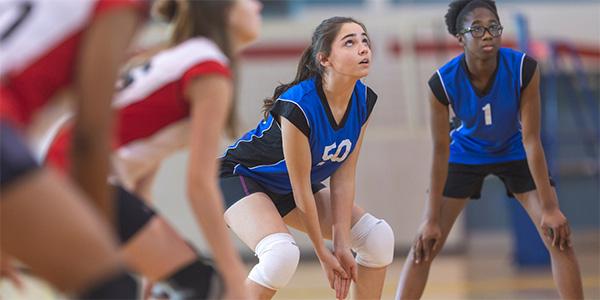
How to Help Your Athletes Stop Tearing Down Themselves
Summary: Many struggle with self-criticism in youth athletes, which can quickly damage their confidence, motivation, and overall performance. After mistakes or tough games, negative self-talk often creates a harmful cycle where poor performance leads to more criticism and even worse results. To break this cycle, kids must learn the power of positive self-talk for young athletes.
Are your sports kids critical of themselves? After every mistake or bad game, do they put themselves down?
When kids criticize themselves excessively, they experience fractured confidence, low motivation and under performance.
The criticism also creates a loop: they perform badly…they criticize themselves…their confidence and motivation sink…they perform badly.
Breaking the cycle starts with helping kids change their self-talk.
When kids dedicate a lot of time and effort to their sport, they want to see the fruits of their labor. Initial emotional responses are a sign that they care about their performance.
The problem is not their initial response to a bad game. The problem is persistent negative responses.
When young athletes bombard their minds with negative criticism, one bad game turns into two, three or four bad games. A hit-less game turns into a slump. Booting an easy grounder leads to more errors.
In reality, what does hyper self-criticism do for kids? It doesn’t make them better players.
Helping Self-Critical Athletes
Kids can stop the cycle by changing their self-talk as a first step in getting back on track.
They should think of what they would say to support a teammate who is struggling. Would kids tell their teammates to quit? Would they tell their struggling teammate they will probably under perform for the rest of the season?
No! They should highlight others’ strengths. They should tell their teammates to keep working hard. They should tell teammates that they’ll experience a breakthrough soon.
Sports kids should tell themselves the same types of positive messages.
Baltimore Orioles manager Brandon Hyde has been giving positive messages to rookie catcher Adley Rutschman, who has been disappointed with his early performance at the major league level.
Rutschman is batting .149 in 12 games since being promoted from Triple-A and has been charged with two throwing errors.
Still, Hyde keeps giving Rutschman positive messages to get his offense on track. Hyde is confident Rutschman will be a solid major league player.
“I told [Rutschman] when he first got here, ‘I just want you to relax. It’s going to be impossible to relax, but relax as best you possibly can and have fun with it.’ It just takes adjustments, and it takes a little bit of time, and he’s doing just fine,” said Hyde.
Hyde knows that positive messages lead to positive performance.
“I know how hard it’s going to be and difficult it is, and he just has to kind of get over the early stage of being a major league player,” said Hyde. “It’s not easy. I just think support, that’s what we’re going to do, and that’s what we’re here for is to stay positive with him.”
When kids send themselves the message to be patient, they will be more patient in games. When they tell themselves they can succeed at the next level, they will perform better.
To help develop patience, sports kids need to talk to themselves in the same manner they would talk to a struggling teammate.
Help sports kids develop positive self-talk off the field that they can use on the field. They should tell themselves, “Stay patient, let the game come to me.”
How to Avoid Self-Criticism in Youth Athletes
1. Use Positive Self-Talk to Break the Cycle of Criticism
Young athletes who constantly put themselves down after mistakes can damage their confidence and motivation. Teaching kids to replace negative thoughts with positive self-talk helps them reset faster and perform at their best.
2. Treat Yourself Like a Teammate
One of the best ways for sports kids to stop being overly self-critical is to ask: “What would I say to a struggling teammate?” Instead of harsh criticism, they should offer themselves encouragement, patience, and belief in their abilities.
3. Patience Builds Confidence in Young Athletes
Reminding athletes to “stay patient and let the game come to me” helps them avoid frustration after tough performances. With time and persistence, patience combined with positive reinforcement boosts confidence and long-term success.
4. Positive Reinforcement Leads to Better Performance
Just like professional coaches use uplifting messages to support athletes, sports kids thrive when they focus on strengths rather than failures. Replacing negative criticism with encouragement helps them stay motivated and perform consistently.
Related Sports Psychology Articles
- Mental Training for Young Athletes
- Helping Kids Perform Their Best in Sports at Crunch Time
- Helping Young Athletes Stay Calm
*Subscribe to The Ultimate Sports Parent Podcast
*Subscribe to Peak Performance Sports on Youtube
Download a free sports psychology report to improve your mental game!
The Confident Sports Kid

When kids lack confidence, they doubt themselves, stop taking risks, play tentatively, and are hard on themselves. As a result, kids often lose their motivation to improve. Ultimately, these barriers keep them from enjoying sports and making the most of their physical talent.
“The Confident Sports Kid” program is actually two programs: one that teaches sports parents how to boost their kids’ confidence, and another that teaches young athletes age 8 to 18 how to improve their self talk, avoid negative thinking, overcome expectations that limit confidence, and much more. The program will help kids boost their confidence in sports and life…and enjoy sports more.
FAQ: How Young Athletes Can Overcome Self-Criticism
Q: Why is self-criticism harmful for young athletes?
A: Excessive self-criticism in sports lowers confidence, reduces motivation, and creates a cycle of poor performance that can lead to slumps.
Q: How can athletes break the cycle of negative self-talk?
A2: The first step is replacing harsh criticism with positive self-talk. Athletes should talk to themselves the same way they would encourage a teammate.
Q: What role do coaches and parents play in reducing self-criticism?
A: Coaches and parents can boost confidence by reinforcing supportive and patient messages, helping athletes stay focused on growth instead of mistakes.
Q: Can positive self-talk really improve performance?
A: Yes. Positive self-talk boosts confidence and patience, helping athletes stay calm, trust their abilities, and perform better under pressure.
Q: What are examples of positive self-talk for athletes?
A: Phrases like “Stay patient, let the game come to me” or “I can succeed at the next level” help athletes develop resilience and peak performance.
Kids Sports Psychology expert Patrick Cohn, Ph.D. has helped athletes for over 35 years to enhance their performance. Dr. Cohn earned a master’s degree in sports psychology from CSUF and a Ph.D. from the University of Virginia, specializing in Applied Sports Psychology. Today, he is the president and founder of Peak Performance Sports, LLC in Orlando, Florida.

Hi there.
I am Gold Coast, Australia and the father of two young athletes, 8 and 6 years old.
We struggle particularly with the older one with high degrees of emotionalism on the pitch or court.
When he is winning he is fine, but the first sniff of a loss and the self criticism and stress levels crank up and it’s over. This is the case in tennis. He is incredibly gifted but can’t dig in when losing. The negative feedback loop is too powerful.
I wondered if u could help with this.
Jason
Your athletes are a bit young for the mental coaching programs with, but you might look into The Composed Sports Kid audio and workbook program: https://shop.peaksports.com/collections/confident-sports-kid-series-digital-version